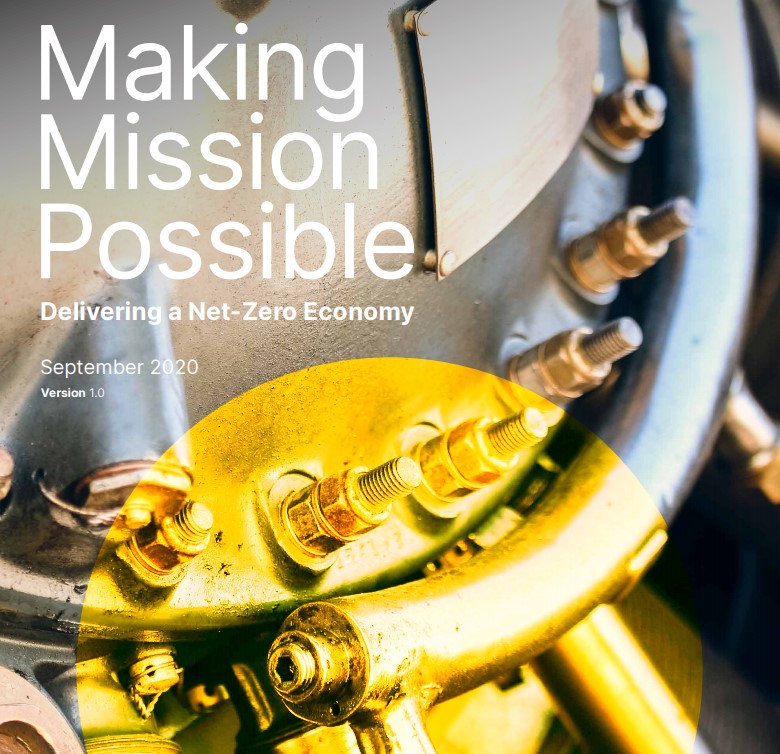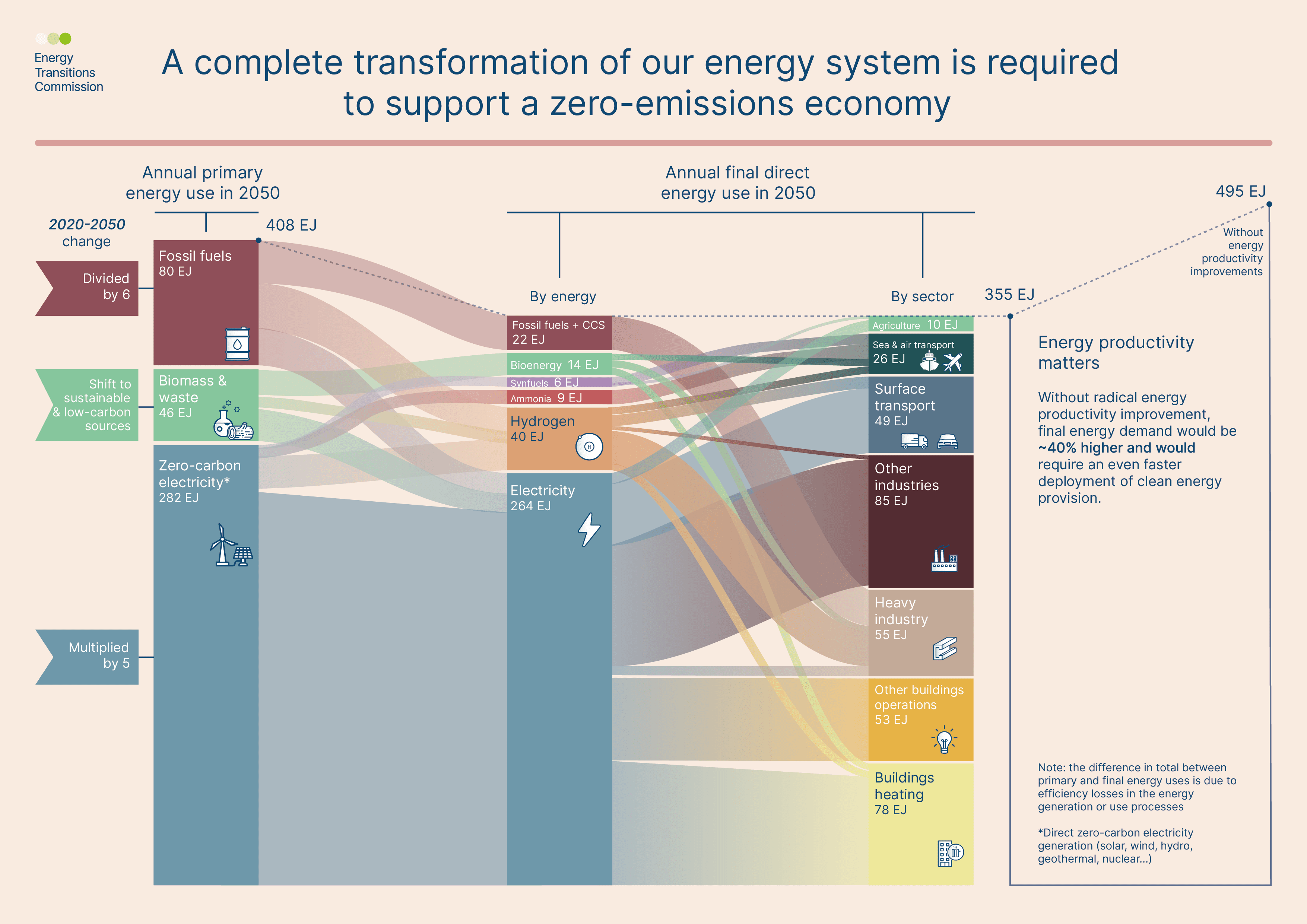Making Mission Possible: report on achieving a zero-carbon economy by 2030
Contents |
[edit] Introduction
The Energy Transitions Commission (ETC) is a global coalition of leaders from across the energy landscape committed to achieving net-zero emissions. Its 2020 report Making Mission Possible – Delivering A Net-Zero Economy highlights actions required to achieve a zero-carbon economy by 2030, including priorities outlined by energy, industrial and financial sector leaders from around the world.
In the report, the ETC puts forward the idea that the world can - and must - achieve net zero greenhouse gas emissions by mid-century. It proposes that "zero must mean zero" in the long term, with no permanent (rather than transitional) reliance on negative emissions to balance continued large-scale emissions from the energy system and industry. The report also also suggests the steps needed to achieve that objective by 2030.
[edit] Clean electricity
Clean electricity would be the primary route to decarbonisation according to the report, which proposes that decreases in the cost of renewable energy could help make this goal achievable. The report argues that growth in electricity supply should come from zero-carbon sources. It also proposes that there is no need to build new coal-fired power capacity to support economic growth and rising living standards.
In economic terms, ETC makes the case that it is technically and economically possible to have a carbon-free economy at a total cost of less than 0.5% of global GDP by taking three steps:
- Using less energy while improving living standards in developing economies by achieving dramatic improvements in energy efficiency and shifting to a circular economy.
- Scaling up clean energy provision by building massive generation capacities of cheap clean power at a pace five to six times faster than at present, as well as expanding other zero-carbon energy sources such as hydrogen.
- Using clean energy across all sectors of the economy by electrifying many applications in buildings, transport and industry, and deploying new technologies and processes using hydrogen, sustainable biomass or carbon capture in sectors that cannot be electrified (such as heavy industry, long-distance shipping and aviation).
[edit] Setting priorities
The signatories of the report suggest that the COVID-19 pandemic has demonstrated the unpreparedness of the global economy to systemic risks and that the unplanned increase in public spending being dedicated to stimulating economic recovery constitutes an opportunity to invest in more resilience.
The report outlines three critical priorities for the 2020s and offers practical actions that nations and non-state parties can commit to in the run up to the COP26 United Nations Framework Convention on Climate Change in November 2021. These actions can help to put mid-century objectives within reach:
- Speed up the deployment of proven zero-carbon solutions – governments, investors and corporations need to work together to build up capacities of zero-carbon power generation to enable the clean electrification of the global economy.
- Create the right policy and investment environment – by removing fossil fuel subsidies, increasing carbon prices and combining them with border carbon adjustments in the absence of an internationally established carbon price. Policies might include putting in place regulations – like fuel mandates or lifecycle emissions standards for manufactured products – that create additional incentives for decarbonisation where price signals are insufficient, and working with financial institutions to channel investment not only to green activities but also to energy intensive industries that make the transition to carbon neutral.
- Bring the next wave of zero-carbon technologies for more difficult sectors to market – so they can be deployed in the 2030s and 2040s, by:
- Focusing public and private research and development on critical technologies (like hydrogen, sustainable fuels or carbon capture).
- Creating demand for new green products and services (through green buyers’ clubs, public procurement and product regulations).
- Financing commercial-scale pilots by de-risking public funds alongside private capital.
The ETC's report is intended to allow all developed economies to reach net-zero emissions by 2050 at the latest, including China. All developing nations would be able to reach net-zero emissions by 2060 at the latest, but would require development finance to de-risk and attract private green investment.
The report is available at: https://www.energy-transitions.org/wp-content/uploads/2020/09/Making-Mission-Possible-Full-Report.pdf
[edit] Related articles on Designing Buildings Wiki
- A zero-carbon UK by 2050?
- Carbon neutral.
- Carbon plan.
- Climate target revisions for Carbon Budget 6.
- Electricity supply.
- Key messages from the UN climate change conference.
- Net Zero All Party Parliamentary Group NZ APPG.
- Net zero carbon 2050.
- Renovation Wave Strategy RWS.
- The future of UK power generation.
- The Government's 10-point plan: what's missing?
- UN Sustainable Development Goals.
Featured articles and news
Repairing historic stone and slate roofs
The need for a code of practice and technical advice note.
UKCW London to tackle sector’s most pressing issues
AI and skills development, ecology and the environment, policy and planning and more.
Managing building safety risks
Across an existing residential portfolio; a client's perspective.
ECA support for Gate Safe’s Safe School Gates Campaign.
Core construction skills explained
Preparing for a career in construction.
Retrofitting for resilience with the Leicester Resilience Hub
Community-serving facilities, enhanced as support and essential services for climate-related disruptions.
Some of the articles relating to water, here to browse. Any missing?
Recognisable Gothic characters, designed to dramatically spout water away from buildings.
A case study and a warning to would-be developers
Creating four dwellings... after half a century of doing this job, why, oh why, is it so difficult?
Reform of the fire engineering profession
Fire Engineers Advisory Panel: Authoritative Statement, reactions and next steps.
Restoration and renewal of the Palace of Westminster
A complex project of cultural significance from full decant to EMI, opportunities and a potential a way forward.
Apprenticeships and the responsibility we share
Perspectives from the CIOB President as National Apprentice Week comes to a close.
The first line of defence against rain, wind and snow.
Building Safety recap January, 2026
What we missed at the end of last year, and at the start of this.





















